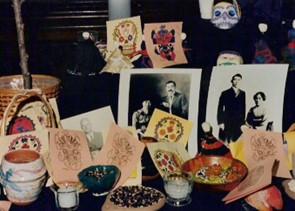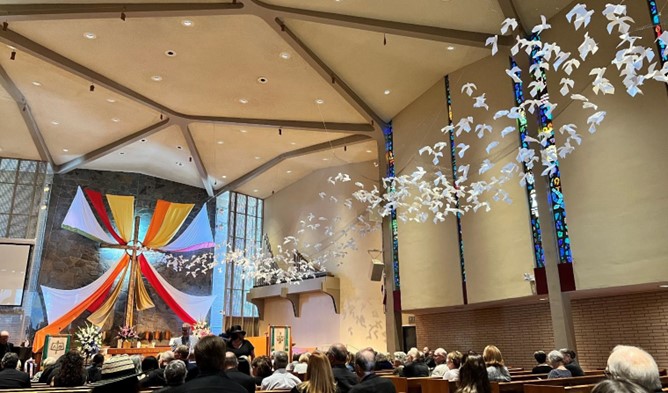Giving Thanks for the Saints
Giving Thanks for the Saints
I am reminded of your sincere faith, a faith that lived first in your grandmother Lois and your mother Eunice and now, I am sure, lives in you.
2 Timothy 1:5
I expect that sometime this last week, many of you gave thanks for loved ones who have gone before us —family members, church friends and leaders, or ancestors in the faith such as Abraham and Sarah. When I was a pastor, I enjoyed planning worship for the first Sunday in November as a Communion of the Saints. Like the first Sunday in October, World Communion Sunday, we are reminded that communion is more than the holy gathering of the members of one congregation, but a glimpse into the heavenly banquet, where we are connected to children of God around the world and even in heaven, as we all come at the invitation of Christ, who is spiritually present at the table.
 I was sharing with a Mexican-American member of Interwoven that one of my favorite worship events happened when I was an intern at Immanuel Presbyterian Church in Koreatown. (Actually there were several memorable worship experiences there, which reminds me how important church internships are in the formation of pastors.) The event I was remembering to Maria was a kind of mash-up of an organ concert/laser light show (quite the sensory experience in that big cathedral-like sanctuary!), and our version of Dia de Muertos, or Day of the Dead.
I was sharing with a Mexican-American member of Interwoven that one of my favorite worship events happened when I was an intern at Immanuel Presbyterian Church in Koreatown. (Actually there were several memorable worship experiences there, which reminds me how important church internships are in the formation of pastors.) The event I was remembering to Maria was a kind of mash-up of an organ concert/laser light show (quite the sensory experience in that big cathedral-like sanctuary!), and our version of Dia de Muertos, or Day of the Dead.
An elder and I brought items that gave a nod to actual Mexican traditions, interpreted for our multi-racial congregation. As an example, we wanted to allow people to remember their own departed loved ones at our version of an ofrenda. We gave everyone small pieces of paper on which they were to write the names of those loved ones they wanted to remember, which they were able to put on the ofrenda. To set the stage, the elder and I put pictures of our departed loved ones —which meant that this ofrenda had very old photos of our German and Japanese ancestors!
There were fun elements of the evening, as happens with traditional Day of the Dead celebrations, but when people were invited to bring forward the names of their loved ones, I still remember how moved the people were. The pastor suggested that dominant-culture folks like him had lost their customs to remember their loved ones, so it was a gift to be able to honor their ancestors using another’s tradition.
On Saturday, November 18th, we will have the last Presbytery meeting of 2023. This is always a full meeting, with annual actions such as electing leaders and passing the budget for coming year. In November, we also honor the Indigenous people who have lived in this land for millenia. And, we have our annual necrology, naming all minister members and congregational leaders who have died in the past year. Please let me know if you have leaders so we can include them in worship.
As it happens, there will be some exciting things to look forward to, including consideration of chartering GKI-LA, the Indonesian fellowship worshiping in Covina, and providing support for the renovation of the Eagle Rock Presbyterian Church property to become the eventual home for Interwoven New Worshiping Community. With this plan, we are calling on the legacies of multiple ministries of San Gabriel Presbytery, not only honoring the many years of ministry of the Eagle Rock congregation, but also because Interwoven benefits from the legacy of South Hills Presbyterian
Church, and partial funding for the renovation may come from the recent sale of the property of St. Andrew’s Presbyterian Church.
Some people seem to believe that churches as an institution were to continue forever. I often wonder whether some folks want church to be the one place that will not change in a world of constant and unpredictable change. However, this presbytery understands that ministries must change in order to serve our changing neighborhoods. Better than any presbytery I know, San Gabriel has been able to reflect the ethnic diversity of our region, and it is because our congregational leaders know that the churches are entrusted with serving a particular neighborhood, but if they cannot do that effectively, they should contact the presbytery and find a church who can.
When I think of the saints who have gone before me, I do not believe to love them means we cling to who they were and the way they lived out their faith. On the contrary, we should give thanks for the ways they were bold to make difficult decisions in order to meet the challenges of their time and place. Our call is to meet the challenges we face, and to leave a legacy for the next generations of disciples— and this may require sacrifice, as our ancestors made sacrifices for our sake.
As we give thanks for the shoulders we stand on, may we look for those we are to lift up, that they may be able to proclaim the good news of Jesus Christ for future generations. As we have looked to our ancestors to teach us about the life of faith, may we be aware that we are ancestors for others—and what are we nurturing and enabling in them?
May we always be grateful for all the saints, known and unknown, who have helped us be who and where we are. May we be grateful for saints who are still laboring and loving with us, as well as those who have gone on to glory. I am grateful for you who have been faithful leaders of this presbytery for years, and for the ways you welcome folks who are coming new into the presbytery. Together may we continue to grow and change in relevance for our ever-changing community.
See you on the 18th!
Peace,
Wendy

